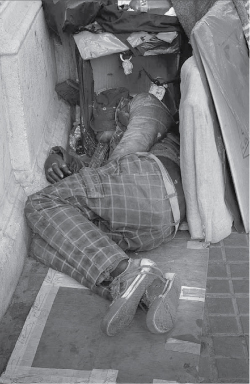Despite recent steps by Montreal and the Ville Marie borough to alleviate problems surrounding homelessness downtown, ongoing policies continue to marginalize the very people they’re trying to help.
“There’s some blah, blah, there’s some analysis, but at the same time they’re not looking at their laws,” said Pierre Gaudreau, coordinator at RAPSIM, an umbrella organization that advocates for the homeless. “Most of them help the homeless. But their actions in managing the occupation of public space leads to a worse situation for homeless people. It’s almost always the case: there’s help, support, and repression—often by the same people.”
Gaudreau is referring to so-called incivilities by-laws—against, for example, loitering, public drinking, and ‘using urban equipment for uses other than those intended.’ More of these laws are added each year.
 In 2006, Ville Marie passed a new by-law making it illegal to spend the night in the borough’s 15 public squares. In 2007, dogs were banned from Viger and Berri Square—known hangouts for street youth and their pets. This year, there’s a push to ban walking more than two dogs at once—seen as another move to criminalize the homeless.
In 2006, Ville Marie passed a new by-law making it illegal to spend the night in the borough’s 15 public squares. In 2007, dogs were banned from Viger and Berri Square—known hangouts for street youth and their pets. This year, there’s a push to ban walking more than two dogs at once—seen as another move to criminalize the homeless.
“(The laws) are discriminatory,” said Aki Tchitacov, executive director at Dans la Rue. “You see ticketing for offenses most average citizens would never be ticketed for. It’s a very self-serving policy. Do anything to clean up the parks, clean up the streets.” Almost all the youth who use their day center have been ticketed, he added.
“In many situation, it’s discriminatory,” said Gaudreau. “In many situations, it’s by-laws written for homeless people.”
According to a study by researchers at the Université de Montréal, over 15,000 tickets were given out to the homeless in just over two years—and that’s a low estimate.
They also found that 72 per cent of the homeless and street youth who had been ticketed end up in jail for unpaid fines.
“For many years, it was the principle way police were managing the issue of (the homeless) in public spaces,” said Gaudreau.
Police defend their use of ticketing while acknowledging it’s not a perfect solution.
“The act of giving tickets helps us stop certain homeless people who are participating in certain behaviours (that bother the population),” said Inspector Pierre Cadieux, in charge of the homelessness file for the Montreal police. “We are conscious that criminalization is not the solution, but (ticketing) is necessary to our work. We need to intervene.”
It’s not the first tool police use, Cadieux added, and estimated 80 per cent of police interventions with the homeless don’t end in ticketing.
“We’re conscious that judiciarisation isn’t best,” he said. “Our first interventions are more humane.” Nonetheless, police have a job to do, Cadieux said. “Our mandate is to harmonize the use of public space.”
Gaudreau doesn’t lay the blame solely on the police. “There’s police action, political action, and then there’s citizen action,” he said, calling on Montrealers to show more tolerance.
The consequences of jailing can be serious.
“Anything would be better then having these people end up in jail,” said Tchitacov. In many cases people who are in the process of reforming their lives—first jobs and apart-ments, getting the psychiatric care they need—are imprisoned for ticketing debt. “Often, just as they’re getting somewhere, this situation comes back to harm them,” he said.
There’s also the concern that locking up already marginalized people with hardened criminals could push them towards criminal behaviour.
There have, however, been steps in the right direction.
The Quebec Human Rights Commission is reviewing the laws. In May, Montreal’s municipal court designated a special prosecutor to work solely with homeless people facing ticketing debt. A mediation project—Projet EMU - was launched to help resolve disputes between the homeless and Montreal residents.
But none of these solve the problem itself.
“Let’s give amnesty, let’s look at the laws,” said Gaudreau. “In many situations, the tickets are given on a discriminatory basis. So let’s look at the way we act towards the homeless in the public space. (Ticketing) costs a fortune to society and it doesn’t help anyone.”
Clay Peters, a volunteer with the St. Michael’s Mission, spoke more plainly. “A fucking crying shame,” he called the situation. “It’s pointless. A—they don’t have any money. B—when they have money they’re not going to use it to pay a ticket. And the thing is, they’ll just find another place to sleep.”

























Comments
Please login to post comments.